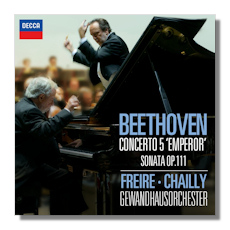
The Internet's Premier Classical Music Source
Related Links
- Beethoven Reviews
- Latest Reviews
- More Reviews
-
By Composer
-
Collections
DVD & Blu-ray
Books
Concert Reviews
Articles/Interviews
Software
Audio
Search Amazon
Recommended Links
Site News
 CD Review
CD Review
Ludwig van Beethoven

- Piano Concerto #5 in E Flat Major "Emperor", Op. 73
- Piano Sonata #32 in C minor, Op. 111
Nelson Freire, piano
Gewandhaus Orchestra/Riccardo Chailly
Decca Classics 4786771 61:58
Putting the last piano concerto and piano sonata of Beethoven on a disc together makes a great deal of thematic sense, and Nelson Freire is an absolute pro in this music. He's recorded more as he's aged, and we should all be grateful for it. Riccardo Chailly has entered an odd phase of his career; he's usually trying to do something innovative or different for the sake of doing something innovative or different. Here he allows his excellent orchestra and soloist to take center stage, and the results are mostly excellent.
Age has not dimmed Freire's considerable virtuosity, and it hasn't even come close to touching his remarkable musicality and intelligence. He plays with alacrity and flair, bringing out all kinds of details and proving fully attuned to the various moods within the mighty "Emperor" Concerto. For his part, Riccardo Chailly gives a fine account of the orchestral part, lacking only the monumental power of his Brahms collaborations with the same pianist and orchestra. The Gewandhaus is an exceptionally fine ensemble that could probably play this music asleep, but they feature both warmth and strength. The first movement clocks in at a very quick 19:39 – Robert Cummings has pointed out in his extensive coverage of the concerto that the quickest he knows is about 20:04 – but nothing feels rushed or overly hasty. If anything, the music gathers steam as it goes along, with the orchestra and conductor seemingly more incisive as the movement progresses. Freire shapes his solo part with a delightful mix of nobility and good humor, and the listener comes away satisfied.
The Adagio is always the high-point for me; a great performance in my view must have a great slow movement to convince me. Decca has many great versions of the work, and this becomes another. Chailly wisely eschews his current "period practice" fad to shape a fluid but carefully phrased accompaniment. Freire enters with delicacy and poetry, clearly understanding the composer's intentions. The whole movement is gently propelled, and while some might prefer a slighter weightier approach, it would be difficult to deny the sensitivity and grace with which soloist and conductor phrase this music. The concluding Rondo is thankfully light and not the least bit clunky, finishing a very intelligent performance.
Flying solo, Freire nails Beethoven's final piano sonata. Completely unfazed by the technical challenges, the pianist is completely in tune with the composer. Not only is he amazing from a virtuosic standpoint, but the depth of feeling is so sincere that the performance is deeply moving. The Arietta has a singing, soulful quality that reflects a lifetime of experience and commitment, despite the fact we have so little of Freire's Beethoven on disc. Decca captures the young-at-heart master in marvelous sound, and the entire program is a tribute to all involved.
Copyright © 2015, Brian Wigman





















